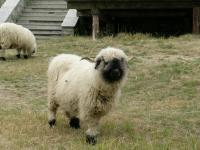n. A type of wild sheep (Ammotragus lervia) of northern Africa; called also
n. sing. & pl. [ OE. shep, scheep, AS. sc&unr_;p, sceáp; akin to OFries. sk&unr_;p, LG. & D. schaap, G. schaf, OHG. scāf, Skr. chāga. √295. Cf. Sheepherd. ]
☞ The domestic sheep (Ovis aries) varies much in size, in the length and texture of its wool, the form and size of its horns, the length of its tail, etc. It was domesticated in prehistoric ages, and many distinct breeds have been produced; as the merinos, celebrated for their fine wool; the Cretan sheep, noted for their long horns; the fat-tailed, or Turkish, sheep, remarkable for the size and fatness of the tail, which often has to be supported on trucks; the Southdowns, in which the horns are lacking; and an Asiatic breed which always has four horns. [ 1913 Webster ]
Rocky mountain sheep.(Zool.)
Maned sheep. (Zool.)
Sheep bot (Zool.),
Sheep dog (Zool.),
Sheep laurel (Bot.),
Sheep pest (Bot.),
Sheep run,
Sheep's beard (Bot.),
Sheep's bit
Sheep pox (Med.),
Sheep scabious. (Bot.)
Sheep shears,
Sheep sorrel. (Bot.),
Sheep's-wool (Zool.),
Sheep tick (Zool.),
Sheep walk,
Wild sheep. (Zool.)
n. (Geol.) A rounded knoll of rock resembling the back of a sheep. -- produced by glacial action. Called also
n. (Bot.) The edible fruit of a small North American tree of the genus
v. i. To bite or nibble like a sheep; hence, to practice petty thefts. [ Obs. ] Shak. [ 1913 Webster ]
n. One who practices petty thefts. [ Obs. ] Shak. [ 1913 Webster ]
There are political sheepbiters as well as pastoral; betrayers of public trusts as well as of private. L'Estrange. [ 1913 Webster ]
a. Over-bashful; sheepish. [ 1913 Webster ]
n. A fold or pen for sheep; a place where sheep are collected or confined. [ 1913 Webster ]
a. Silly; simple-minded; stupid. Taylor (1630) [ 1913 Webster ]
n. A hook fastened to pole, by which shepherds lay hold on the legs or necks of their sheep; a shepherd's crook. Dryden. [ 1913 Webster ]
a.
Wanting change of company, he will, when he comes abroad, be a sheepish or conceited creature. Locke. [ 1913 Webster ]
--
n. A keeper or feeder of sheep; also, an owner of sheep. 2 Kings iii. 4. [ 1913 Webster ]
n. (Zool.) The starling. [ 1913 Webster ]
n. A modest, diffident look; a loving glance; -- commonly in the plural. [ 1913 Webster ]
I saw her just now give him the languishing eye, as they call it; . . . of old called the sheep's-eye. Wycherley. [ 1913 Webster ]
n. A printer's tool consisting of a metal bar formed into a hammer head at one end and a claw at the other, -- used as a lever and hammer. [ 1913 Webster ]
n. (Naut.) A hitch by which a rope may be temporarily shortened. [ 1913 Webster ]
n. [ So called because of the fancied resemblance of its head and front teeth to those of a sheep. ] (Zool.) A large and valuable sparoid food fish (Archosargus probatocephalus syn. Diplodus probatocephalus) found on the Atlantic coast of the United States. It often weighs from ten to twelve pounds. [ 1913 Webster ]
☞ The name is also locally, in a loose way, applied to various other fishes, as the butterfish, the fresh-water drumfish, the parrot fish, the porgy, and the moonfish. [ 1913 Webster ]
n. One who shears, or cuts off the wool from, sheep. [ 1913 Webster ]
n.
n.
n. A split of a sheepskin; one of the thin sections made by splitting a sheepskin with a cutting knife or machine. [ 1913 Webster ]
a. Resembling sheep; sheepish. Testament of Love. [ 1913 Webster ]



